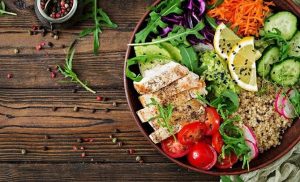While some people believe you’re either born resilient or not, I know that anyone can learn to be more resilient.
The most resilient people in the world have certain behaviors they do consistently that help build and maintain their resilience. Some definitions of resilience talk about the ability to ‘bounce back from adversity’. But why wait to get knocked down? We have an opportunity to feel that sense of Vitality, everyday!
Here’s one definition of Vitality “exuberant physical strength or mental vigor: capacity for survival and continuation of a meaningful or purposeful existence”. [1]
In this article I’ll share 4 things you can do immediately to build your your vitality, whether you’re at work, home (quite likely), or outside social distancing.
While you’ll recognize each of these 4 strategies, don’t blow by them. Instead, as you read each one, ask yourself:
· Am I doing this one?
· Am I doing it consistently?
· What could I do more of to reap the benefits?
· Which one would be most helpful for me right now?
*Note. The following strategies are based on current research as well as my own experience. You may have some physical or dietary restrictions that means one of these suggestions may not be right for you. If you’re in doubt, check with a qualified medical professional first.
Drink Water
Your body depends on water to survive! (coincidently, so does mine!).

Every cell, tissue and organ in your body needs water to work properly. Water:
- Transports nutrients and oxygen around the body
- Helps break down food and extract nutrients
- Rids wastes through perspiration & urination
- Keeps your temperature normal
- Lubricates and cushions joints
How much?
The old 8 glasses/day is close. The Mayo clinic suggests about 4 litres a day for men and about almost 3 liters for women.
I’ve seen a fantastic trend lately where people carry a pretty swank water bottle from meeting to meeting as a way of making sure they get their daily intake.
Here are some pro tips:
1. START the day with a glass of water FIRST THING. in the morning.
- This ensures you start your day re-hydrating.
- You’re starting your day on your terms.
2. Carry a water bottle with you, even if you’re at home these days.
- If it helps, order a nice bottle that makes you feel good to have around. Here’s a list of the top water bottles compliments of etramping.com.
3. Drink a full glass of water before every meal.
- Mealtimes will be your reminder to drink a glass of water.
- For those concerned about weight loss, it helps control your appetite.
- Drink a glass of water one hour before bed.
4. As you drink it, think, ‘I’m so grateful for this cool, clear water.
- It replenishing my body with exactly what I need to be healthy, resilient, and fill in the blank.
Move Your Body

I did a quick google search on the benefits of exercise on resilience. There were only 53,500,000 results. Next…. or as Nike would say, ‘just do it’!
Here are a few examples from some credible sources:
Mayo Clinic – 7 benefits of regular physical activity
Moccassin Guru – the benefits of running
Sports Fitness Advisor – spinning versus running
Bike Cove.com – 10 health benefits of cycling
Homegym 101 – Benefits of exercising
American Heart Association – The link between physical activity and health
Canadian Heart and Stroke – The benefits of physical activity
Here are just a few of the common benefits cited across multiple sites:
- Increases cardiovascular efficiency
- Decreases risk of cardiovascular diseases (stroke, heart attack, etc.)
- Improves mood
- Reduces stress
- Boosts energy / boosts alertness
- Improves sleep
We already know the benefits of exercise so that’s not usually what gets in our way. Sometimes we’re not sure how. There are countless ways to exercise, even if you’re at home. Here’s just a few:
· Walk / Run / Yoga / Cycle / Tai Chi / Dance / Calisthenics, the list goes on.
Facebook and YouTube are exploding with home work-out videos whether Zumba, aerobics, yoga, personal training, even cross-fit, you name it.
There’s no shortage of ideas or information on how to exercise.
If you’ve been relatively sedentary and haven’t worked out in a while, be sure to check with your doctor – no, really – and many doctors do phone consultations.
How long? Well, depends on how fit you are. But for the health benefits, most experts seem to agree about 150 minutes or 2.5 hours per week is the minimum. If you move your body for 30 minutes, 5 days per week, you’ll hit the minimum.
Fitbit and I-watch have motivated millions of people to move their bodies making it easy to track your activity, progress, and even your sleep. The 10,000 steps has become the rage and if you’re motivated by a little friendly competition you can set up virtual group challenges. There are some funny parody’s on people letting the fitness apps control their life. Use it if it motivates you. If it’s not, no worries.
Not sure how to get started? Check out this easy-to-read guide on ‘how to get start exercising‘ by Home Gym 101.
So here are some pro tips:
1. Work out in the morning!
- No matter how busy you get later, too late! Got it in.
- Studies show working out in the morning can boost your fat burning hormones.
- ‘fasted cardio’* has been around for years but it’s had a rebirth.
Some studies show it does not necessarily burn more fat than those who work out one hour after eating breakfast.
*Be careful with this if you have low blood sugar, low blood pressure, diabetes, etc. Again, check with your doctor first.
2. Set a goal. Want to feel better? Get leaner? Just be happier? The more SMART your goals, the more motivating they’ll be.
3. Pick something fun. If you hate running, don’t have that as your go to exercise. Pick something you enjoy and you’re more likely to stay with it.
4. Schedule it in Outlook! Working at home? Family calendar. If someone says, ‘I need to meet with you at…’ you can say, “sorry, that time is taken”.
- This includes breaks during the day. Yes, take breaks and move your body.
5. Involve a friend or family member in your goals. We all need support.
6. Plan the workout. It can be as simple as ‘cardio’ or ‘stretch’ or as detailed as laying out each exercise. Be intentional so you maximize the benefit.
7. Just Do it! Everyone else can wait – you are so worth it.
8. Record your workouts on the family calendar so you can see your progress.
9. You have time. I used to think I needed 60 minutes to get in a workout. If I didn’t have it, I’d skip it. Now I realize anything is better than nothing. Check out Athlene-X ‘Sore in Six minutes’ or try this 7-minute workout app.
- No equipment? 20 squats, 20 push-ups, 20 sit-ups, 10 chins, do 3 rounds and you’re done in 15 minutes. You have 15 minutes.
10. Consistency is key. What ever your goal, stay with it. Improving fitness, flexibility, learning dance routines or a new yoga pose takes time. See #3.
Eat Healthy

Here’s another strategy that seems like such common sense. ‘Eat a balanced diet’, ‘everything in moderation’, ‘eat your vegetables’. Sound familiar? Like exercise, there is plenty of information out there on how to eat healthy. We all know what to do so this is a great time to check in on how you’re doing.
As you read through some of these fundamentals[2], ask yourself:
What’s one thing I could do, or do differently that would really make a difference?
- Eat a variety of healthy foods
- Eat plenty of fruits and vegetables
- Eat whole grain foods
- Eat protein (if you’re vegan or vegetarian choose plant-based protein)
- Choose foods with healthy fats

How often should we eat? The traditional guidance is to eat 3 meals a day: one in the morning, afternoon, and early evening. The idea is that by eating regularly, you regulate your blood sugar, have steady fuel for physical and mental energy and you have fewer cravings due to feeling satiated or full.
In a Harvard study on eating frequency and weight loss, they compared two groups eating the same amount of calories over a 6 month period. One group ate 6 meals/day while the other group ate 3 meals/ day. There was no significant difference in weight loss between the 2 groups at the end of the study.
Intermittent fasting is so popular right now it deserves mention. To some extent it is about increasing the amount of time we’re fasting (such as when we sleep) and narrowing the time frame in which we eat. The theory is that if we fast long enough for insulin levels go down, then our fat cells can release their sugars as energy to fuel our body and brain – we burn more body fat. Make sure you do your research and consult with your doctor before trying things like this.
Here is a well researched and balanced (pros and cautions) article on on intermittent fasting and an inspiring story on a physician who lost 125 lbs with a whole food diet and intermittent fasting.
How much should we eat?
Some guidelines recommend between 1,600 to 2,400 calories / day for adult women and 2,000 to 3,000 calories/ day for adult men. Of course, it will vary for everyone depending upon activity level, size, health considerations, etc.
Here’s a link to a calorie calculator if you’re interested.
Pro tips:
- Think balanced diet – variety, small portions.
- Plan to have fruits and vegetables, whole grains and protein every day.
- Think color. If you have greens, reds, and browns on your plate, you’ve probably got a good variety of food groups. If it’s all yellow, not so much!
- Try the 3-fist method for portion control. 1 veggie, 1 protein, 1 grain.
- Some people find it helpful to cook several meals at once and freeze them, so you have easy access to a balanced, healthy meal later in the week.
- Make extra fresh veggies, then store them as snacks for the next day.
- If you find yourself snacking ‘too much’ between meals, try drinking water.
- If you eat healthy foods consistently, when you do have a burger and a beer, or say yes to the desert, it’s no big deal.

Sleep Well

This one seems so obvious. I mean, don’t we have to sleep? Well I don’t know about you but when it comes to quality sleep, this is the one I neglect the most.
Sleep allows us to close our eyes, rest our (conscious) minds and our muscles. But it’s also when the body and brain go into cleaning and restoration mode:
- Boosts your immune system. (timely huh?)
- Restores organs, bones, and tissue; replenishes immune cells.
- Clears waste products from the brain
- Transfers short term memory to long term memory through consolidation.
- Repairs and renews tissues and nerve cell.
- Neurotoxins are neutralised and chemicals (hormones) are rebalanced.
Interestingly, there seemed to be way more articles on the negative impacts of poor sleep, then on the benefits. Ironically, this got my attention. Increased health risks, poor perception, poor judgement, and poor performance.
Let’s look at some things we can do, to get a good night’s sleep.
- First, make sure you Drink Water, Move your Body, and Eat Healthy.
- Get exercise during the day
- Limit your intake of coffee
- Plan to get 7-9 hours of sleep each night.
- I often underestimate how much sleep I’ll get. If I need to get up at 6 am to work out, I need to be in bed by 10 pm, not starting to get ready.
- Try not to eat full meals within one hour of going to sleep.
- Create a routine such as reading or meditating.
- Turn off screens 1 hour before bed. Electronics can delay the body’s internal clock and suppress the release of melatonin.
- Start your routine before bedtime; brushing teeth, getting changed.
- If there’s something you’re worried about, write it down.
- This is one I struggle with, so I keep a pen and paper next to my bed.
- If you’re worried about waking up on time, set an alarm.
- Make sure the bedroom is dark.
Again, apps like Fitbit or I-phone can help you set sleep times, goals, and track your sleep so you can see what’s working and keep improving.
So, there you go. 4 strategies you can use now to build your vitality and resilience, even during challenging.
Keep an eye out next week for the third article in this series on how to build your resilience as a leader during challenging times.
[1] Collins English Dictionary – Complete & unabridged 2012 Digital Edition. April 4, 2020.
William Collins Sons and Co. Ltd. 1979, 1986 @ harpercollins. www.dictionary.com/browse/vitality
[2] Government of Canada Food Guide. (2020) https://food-guide.canada.ca/en/


Recent Comments